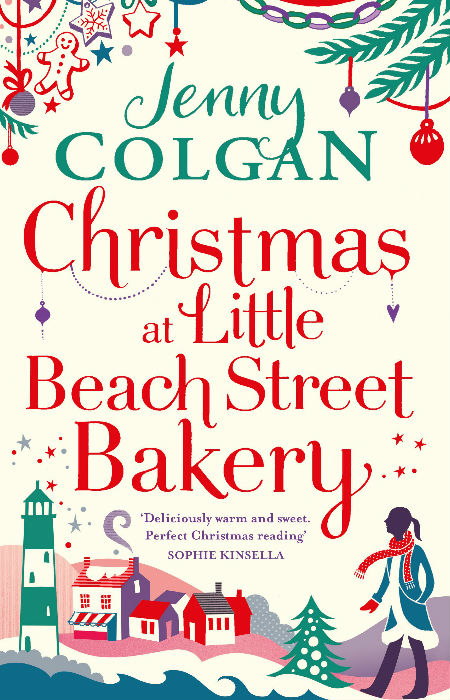
It’s supposed to be the most wonderful time of the year.
But ask anyone, even those of us who are so enamoured of the festive season that refraining from decorating in early October takes an iron will and ridiculous amounts of self control, and they will tell you that Christmas is rarely as perfect as you dream it will be.
Polly Waterford, the protagonist of Christmas at Little Beach Street Bakery by Jenny Colgan, knows this all too well.
Despite being blissfully happy living in a lighthouse with her American boyfriend Huckle, with whom she is madly, giddily in love (fortunately he is just as in love with her) and running her bakery in the quirky village of Mount Polbearne, access to which is controlled by the sea which floods the causeway between village and land save for twice a day, Polly is not locked in some sort of fantasy wonderland where everything goes smoothly.
Not so good for her, or her experience of Christmas, but great for readers who want some drama in their narrative while resting sound in the knowledge that by story’s end, everything will end nice and happily.
That’s the beauty of books by Jenny Colgan – they promise you warmth, cosiness and happy endings but not at the expense of diving deep into the hard realities of life where events rarely play to a warm-and-fuzzy script.
“‘This year,’ Polly was saying boldly, sitting up under the duvet. ‘I am making a LIST. A PLAN. This year everything will not be a disaster.’
‘When has Christmas ever been a disaster?’ said Huckle, turning over, still sleepy and utterly unwilling to relinquish the duvet. Polly was getting up in the pitch dark, as she did for months on end in the winter, and their last heating bill had scared them both rigid, even though the house was almost never warm.” (P. 13)
The delight of Christmas at Little Beach Street Bakery (2016), the third and final instalment of a series – The Little Beach Street Bakery (2014) and Summer at the Little Beach Street Bakery (2015) are the first and second titles respectively – is that it delivers all the warmhearted reassurance you could for while possessing a narrative muscularity you don’t normally see in a genre that is often referred to, unfortunately disparagingly by some, as “Chick Lit”.
There is nothing wrong, of course, with a book that tells a cosy lovely story where life is affirmed, people end up happily and the world emerges a better place for all time and again; in our cynical, hard scrabble world these sorts of stories are often scorned but the truth is, being reassured that life can be good and wonderful and full of hope is an eminently worthwhile thing.
It may not magically unleash an improvement in someone’s life, but a few hours of escapism may be just what is needed to give someone time to breathe, regroup and have another shot at taking the fictional and making it real.
Think that’s a lot to ask of book like Christmas at Little Beach Street Bakery?
You may be right, but there’s something delightfully empowering about reading a tale of someone who has found their bliss but who comes to realise, through a series of escalating events, that while flaws, mistakes and misunderstandings can creep into even the most ideal of situations, there is still a reason to cling to hope and expect the very best.
Colgan manages to walk this rather fine line between twee idealism and grounded bliss, always landing on the very human side of the equation, where hope and joy are allowed to spring eternal but not at the expense of a lived, authentic life.

While your reviewer is only one Colgan book into his Beach Street Bakery journey, it is already apparent that Colgan has a rare gift for adding some impressively dramatic meat to her feel good bones.
Polly is, at first glance, the woman who has it all – loving, emotionally-stable and supportive boyfriend, a close best friend in Kerensa, a puffin called Neil as a pet (an injury precludes him from going back to the wild full-time) and a thriving bakery which is a hub of the village for friends like Selena and customers like the bevy of old ladies who relies on her for baked goods, pastries and the chance for some gossip (Polly is not the purveyor so much as the provider of the locale where it takes place).
But dig a little deeper, and Colgan admirably does with an insight and empathy that invests her characters with real flesh-and-blood veracity that vaults them far beyond being mere one-note enablers of the narrative, and you will discover that she is close to financial insolvency, that there’s a secret resting between her and Kerensa, and Huckle and Kerensa’s husband (and Huckle’s best friend, rich fellow American Reuben) that bears within it the capacity to tear down all the bliss and happiness currently within Polly’s contented grasp.
Polly is also the child of a childhood marred by a father who absconded before she was even born, a one night stand who didn’t wait around to be something more, and a mother who took her romantic rejection as the death of all of hopes and dreams for life, shutting down before her life even really got going.
So there is some pain there, pain that Colgan wisely doesn’t brush off as deftly solved with sitcom-level ease, allowing Polly’s grief at never having the family everyone else takes for granted to play out in full, in ways that make you realise that you can never judge someone’s life purely by its glossy, happy cover.
We’re all guilty of doing that but as the story progresses, we come to realise that Polly, Huckle, Kerensa, Reuben, Selena and everyone else in the lovely orbit of Mount Polbearne, aren’t perfect exemplars of the human race and are just as hurt and broken as the rest of us.
“It was nearly Christmas Eve, and Polly was still hard at work. She had started playing Christmas carols in the shop now; she refused to do it earlier, partly because it made it sound like a coffee shop and encouraged everyone to stay for absolutely ages, and partly because she couldn’t still to ‘Mary’s Boy Child’ more than four hundred times per holiday season.” (P. 176)
But, and this is key, especially in Colgan’s world, they have hope and love and a chance for things to be better and while that’s not true for everyone out there in real life, there’s something about reading about things having the potential to be better and becoming better, that stirs the soul and rallies morale and that is never a bad thing.
Sure, your life may not work itself out as wonderfully as it does in Colgan’s gorgeously-uplifting books, but because Colgan doesn’t pretend that Polly et al are perfect to begin with and no harm can come to them, their happy endings feel deserved, worked for and real while still providing that does of heady optimism we all need.
It’s a delicious mix that satiates our dramatic need for reading about real people going through real trials while providing that injection of energising escapism that takes us from the travails of the everyday while giving us some nascent hope that maybe life can be that wonderful.
Maybe it can’t be, and let’s be honest, no one’s life ends as perfectly as the people in a Colgan novel do (though to be fair, your reviewer is relying on one book and one book only), but the idea that things might get better, can get better? Ah, that is more valuable than words.
Especially at Christmas where we are told again and again that happiness is reborn, hope springs anew and all the things that ail find some salve and solution.
Do we honestly believe that? Probably, not deep down, but what a lovely, captivating image on which to dwell, if only for the length of a book (and hopefully beyond), to temporarily reside in a world where Christmases, and life itself, can be redeemed, where things may go horribly wrong but they can go soul-upliftingly right, and where all those merry, warm and cosy dreams of the festive season don’t just make a character feel good, they change their lives for the better, and then some.
Christmas at Little Beach Street Bakery is a joy – an escapist piece of warmth, good humour and possibilities that nonetheless feels real enough thanks to a crackling plot and robustly-realised characters that you get to the end of it and think, maybe just maybe, life will rise up to meet my hopes and dreams, and hopefully Polly will be waiting with pastries and a reassurance than even the worst mistakes can be turned into something miraculously wonderful that lasts well beyond the sparkling promise of Christmas.